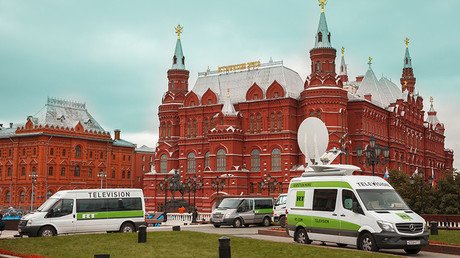Red Scare redux? US imposes World War II-era ‘foreign agents’ designation on Russia media

The Soviet-era McCarthyism that swept America in the mid-20th century was mere child's play compared to the Russophobic hysteria now running amok in the land, where Russian media is even being required to identify itself with a Nazi-era designation.
The most disturbing aspect about the spectacular crash and burn of US-Russia relations in the last year is not necessarily the lightning speed with which it occurred, but that it was a deliberate, premeditated act of political violence that was absolutely avoidable.
The all-out anti-Russia campaign arrived with such swift, unwarranted ferocity that it would have made the late US Senator Joseph McCarthy - whose name is practically synonymous with witch hunts - sit up and take note. And just when you think we've hit rock bottom in the bilateral relationship, a trap door swings open below your feet, revealing yet another precipitous drop.
In what appears to be the basement as far as US-Russia media relations go, the US Department of Justice has issued an outrageous demand that RT [American branch] register itself as a "foreign agent" to continue operations on US soil.
What makes the US demand especially unacceptable, if not downright repulsive, is the history behind the 1938 Foreign Agents Registration Act, or FARA, which was created to counter pro-Nazi agitation. Few people could have forgotten how much blood, sweat and tears Russia sacrificed in its extraordinary effort to repulse Hitler's forces from its territory. Indeed, without Russia's incomparable sacrifice, which broke the back of the Nazi war machine, it would be altogether useless to speak of a 'free media' today.
This week, during a session of the Russian Federation Council’s Interim Committee on the Protection of Sovereignty, RT’s Editor-in-Chief Margarita Simonyan explained that according to the channel’s lawyers, the US branch staff could face harsh penalties if RT fails to follow through with the demands.
“We received a letter from the US Department of Justice, demanding that we register as a foreign agent. By October 17 we must ‘whip ourselves’ and say that we are a foreign agent,” Simonyan said, adding that “[our] lawyers tell us that if we [RT’s American branch] do not register as a foreign agent, arrests of our employees, seizure of property will follow – absolutely serious things.”
As was the case with the expulsion of Russian diplomats in the US, which led to tit-for-tat actions, Moscow may have no choice but to impose retaliatory measures against US news outlets operating on Russian territory.
“Our [Russian] legislation envisages a possibility of imposing retaliatory restrictions against the… media of the states that have restrictive [regulations] specifically limiting the professional activities of Russian journalists,” Foreign Ministry spokesperson Maria Zakharova said at the meeting.
What is especially disconcerting about these latest developments is that they were decidedly unnecessary and avoidable.
Fake news fallout
Our present time of troubles began immediately after Hillary Clinton's 'surprise' defeat in the 2016 presidential election, which the Democrats conveniently blamed on the Russians, of course. After all, how could a candidate who needed to cheat during the debates ever be expected to lose?
In any case, what happened next was truly despicable and designed to prevent any future US-Russian cooperation (which the NeoConLiberal faction refers to as "collusion"). On the basis of nothing more substantial than fake news and rumors, Barack Obama expelled 35 Russian diplomats from the United States just days before the New Year's holidays in retaliation for alleged US election hacking.
Not even the mighty Trump could stop the media-induced mass hysteria that followed: sanctions, the seizure of Russian property, a crackdown on Russian companies, and attempts to silence Russian media. All the while, US-led NATO forces, entering a backdoor into Eastern Europe that was cracked wide open with the crowbar of anti-Russis scare tactics, have set up permanent camps on Russia's very doorstep.
One nothing burger, please, hold the hysteria
Despite the non-stop media histrionics, not a shred of evidence has been produced to show that Russia "hacked" the 2016 US presidential election. Thus, in order to save face and keep the anti-Russia ball bouncing, the torch-carrying inquisition has turned its attention on the social media giants, most notably Facebook and Twitter, to come up with the goods on Russia.
Prior to a public hearing scheduled for Nov. 1 before the Senate Intelligence Committee, Facebook released the following soggy statement by Alex Stamos, Chief Security Officer: "In this latest review, we... looked for ads that might have originated in Russia — even those with very weak signals of a connection and not associated with any known organized effort. This was a broad search, including, for instance, ads bought from accounts with US IP addresses but with the language set to Russian — even though they didn’t necessarily violate any policy or law. In this part of our review, we found approximately $50,000 in potentially politically related ad spending on roughly 2,200 ads."
Just listen to that serial string of uncertainties: "might have, very weak, didn't necessarily violate, approximately, potentially, roughly..."
In other words, US politicians are on a wild goose chase, and this becomes clearer when we see exactly what that $50,000 actually bought - not much. As Facebook admits, “44% of total ad impressions [number of times ads were displayed] were before the US election on November 8, 2016; 56% were after the election.”
Meanwhile, over “25% of the ads were never shown to anyone.”
Republican Senator Richard Burr, chairman of Senate Intelligence, who understands perfectly well that his political career hangs in the balance over this anti-Russia campaign, called for the November hearing because he was "unhappy" with what the masters of the social media universe had provided so far, which was, in essence, nothing. A nothing burger.
"What I am interested in is what all the social media platforms know about activities on their platforms specifically funded by Russians, and I believe that that's something that is worthy of an open hearing," Burr told CNN, the very channel whose own correspondents were caught admitting that the Russian hacking story was pure ratings-chasing nonsense.
Burr and Senator Mark Warner, the top Democrat on the committee, declined to provide further details on their findings, suggesting once again that the investigation has turned up empty-handed.
Daniel Faraci, a political analyst and director of Grassroots Political Consultants LLC, told RT that “any alternative news media coming from international sources … [and even] bloggers and social media” face similar pressure from the US authorities.
He also said that Washington’s goal is “shutting [down] the voices of anything that is not MSM.” For anybody following recent moves by the titans of tech, the sultans of search, that news is not surprising.
While the Senate Intelligence Committee continues to waste precious political time and money, President Donald Trump asked the bipartisan group to investigate the media, which sounds like a sound idea all things considered.
“Why Isn't the Senate Intel Committee looking into the Fake News Networks in OUR country to see why so much of our news is just made up-FAKE!” Trump tweeted Thursday.
Speaking of Twitter, that social media company also had very little to tell the Senate Intelligence Committee. It was shown at the hearing that RT, RT America and RT en Español spent $274,100 for 1,823 US ads for their respective Twitter accounts that “definitely or potentially targeted the US market." Yet isn't that exactly the purpose behind commercial advertising, of course, to target a particular consumer market, a capitalistic idea that seems strangely lost on US investigators?
Margarita Simonyan, the RT Editor-in-Chief, remarked that "similar campaigns are conducted by the American media in the Russian segment of Twitter. It’ll be very interesting to find out how much they spend on it, who they target and for what purpose.”
At this point, a lot of Americans must be wondering, at the very least, why their tax-supported representatives on Capitol Hill are wasting so much time and energy trying to smear Russia when over a year of mudslinging has still failed to produce the desired results. At the same time, Russian expatriates who have settled in America must also be slightly confused and perhaps even slightly worried at this juncture. Indeed, if Russian diplomats can be treated in such a coarse, disrespectful manner, what about the average person?
Indeed, would anybody be surprised if those Russians now living in America - a number estimated to be in the millions - wake up one sunny day and find themselves forced to wear special tags in public, identifying themselves as "foreign agents" from that far away, suspicious country that the mendacious media and unthinking think-tanks have argued for so long is the root of all earthly evil?
I write that only partially in jest, because clearly the wave of Russophobia that has settled upon Washington like an impenetrable fog will not lift anytime soon. At least not while Donald Trump - the ultimate bugbear of the NeoConLiberals, the hawkish clan that would go so far as to sabotage US-Russian relations to invalidate his presidency - remains in power, disturbing the swamp creatures.
@Robert_Bridge
The statements, views and opinions expressed in this column are solely those of the author and do not necessarily represent those of RT.
















